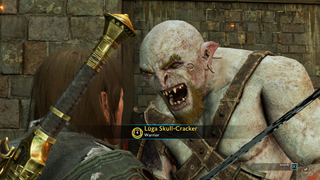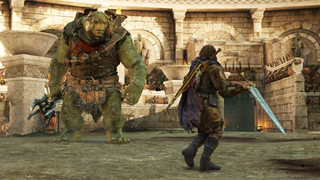The real reason Shadow of War's loot boxes are bad: they make the game boring
It's not that they cost money, it's that they give you dull orcs.
The growing ubiquity of loot boxes continues to stoke outrage. And while concern over microtransactions is warranted, I think the weeks of anger we saw directed at Middle-earth: Shadow of War was focused on the wrong thing.
Yes, it's uncool that loot boxes have oozed into singleplayer games, and yet another of the major games of 2017. That sucks. As Wes argued in our staff discussion last week, loot boxes threaten to homogenize the reward systems of dissimilar games into a samey, randomized mush.
But buried beneath the internet fury about Shadow of War was the fact that, actually, you don't need to interact with loot boxes at all in order to enjoy or complete it, as multiple reviewers made clear. This anger even drowned out arguably more egregious microtransactions, like the two-hour booster 'potion' you can purchase to double the rate that Talion earns experience, pure heresy in a grindy, open-world RPG.
The real reason these loot boxes are repulsive is that they allow people to bypass the most fun part of Middle-earth: Shadow of War: cultivating rivalries.
When you unbox an orc from a war chest and add them to your army, you haven't had to hunt, fight, and outwit that orc. You don't have a history with them, because they're instantly loyal to you. You don't have to interrogate pathetic orc worms in order to reveal their weaknesses. You don't kill them, only to have them [dramatic camera spin] cheat death and reappear. You don't even get to hear them speak—a huge part of that orc's personality, as we learned last week.
These moments are what make Shadow of War a good videogame, and Monolith and Warner Bros.' decision to build a way to sidestep them is a self-inflicted wound on the game's design. Boxed orcs are strangers, but Shadow of War forces them upon you as friends.

Organic, free-range orcs are better for you
The biggest payoff of the mechanics, missions, and orc personalities that make up the Nemesis system is the decision to kill, shame, or convert an orc captain into a loyal soldier. You've dueled with one of these lieutenants and cut down a bunch of their minions, eventually whittling them down to a weakened state. You're holding their fate in your hands—the culmination of possibly hours of gameplay. There's selfish relief in gutting them right there and then, excising them from the map. On the other hand, it's delightful to bring them over to your side, flipping one of Sauron's chess pieces into an asset you'll use against him.
Comic deals, prizes and latest news
Sign up to get the best content of the week, and great gaming deals, as picked by the editors.
Losing an orc I love is one of my favorite moments in Mordor because you usually walk away with a story of bravery or martyrdom.
When you buy a boxed orc, you're missing out on this payoff entirely. There's no beginning, middle, and end to your story with that character. It's the same reason that I feel nothing when XCOM 2 hands me a high-level soldier as a mission reward in the late game—why would I make a random newcomer part of my A Team when I've spent hours investing in characters I carefully made myself?
But even worse, Shadow of War's boxed orcs undermine your connection with the rest of your army. Whole systems of the game are built around upgrading your orcs. You can send them on missions to kill other captains, or level them up by making them fight in Pokémon-style arena battles. You do this stuff to prepare for Shadow of War's fortress stronghold battles, for which you handpick a few orc captains to fight alongside you, bringing their unique attributes to bear against an enemy overlord, his warchiefs, and the defenses of the fort.

Fortress battles are challenging and chaotic. Your captains are spread out across a relatively large area, and you can lose track of them as they fight independently. Deciding which orc to bring means weighing whose life you're potentially willing to sacrifice to complete a major mission, a life that you might've invested hours into leveling and bonding with.
But alternatively, you can spend some in-game currency, crack open a war chest, and instantly get an orc that's leveled proportionately to your campaign progress, because the contents of Shadow of War's boxes scale with your level. In this way the the whole system undercuts the fun risks you'd otherwise have to make: I can drop some Mirian and instantly get one or more ready-to-fight, disposable captains. Losing an orc I love is one of my favorite moments in Mordor because you usually walk away with a story of bravery or martyrdom.
The anger at loot boxes is rational, but as it often does, the internet's collective criticism missed the point. Shadow of War's loot boxes aren't bad because they monetize orcs, weapons, and armor, they're bad because they circumvent the essence of what makes the game interesting: being bullied by assholes like Mozû the Blight, befriending them, and then then losing them forever in a heroic castle siege.

Evan's a hardcore FPS enthusiast who joined PC Gamer in 2008. After an era spent publishing reviews, news, and cover features, he now oversees editorial operations for PC Gamer worldwide, including setting policy, training, and editing stories written by the wider team. His most-played FPSes are CS:GO, Team Fortress 2, Team Fortress Classic, Rainbow Six Siege, and Arma 2. His first multiplayer FPS was Quake 2, played on serial LAN in his uncle's basement, the ideal conditions for instilling a lifelong fondness for fragging. Evan also leads production of the PC Gaming Show, the annual E3 showcase event dedicated to PC gaming.
Most Popular


